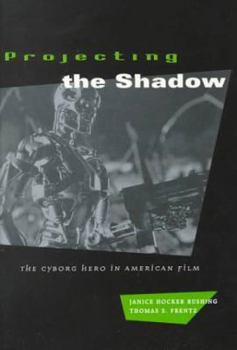Projecting the Shadow: The Cyborg Hero in American Film
Select Format
Select Condition 
Book Overview
Part human, part machine, the cyborg is the hero of an increasingly popular genre of American film and, as Janice H. Rushing and Thomas S. Frentz so provocatively suggest, a cultural icon emblematic of an emergent postmodern mythology. Using the cyborg film as a point of departure, Rushing and Frentz examine how we rework Western myths and initiation rites in the face of new technologies. Through in-depth examinations of six representative films--Jaws, The Deer Hunter, The Manchurian Candidate, Blade Runner, The Terminator, and Terminator 2--Rushing and Frentz track the narrative's thread from the hunter to his technological nemesis, demonstrating how each film represents an unfolding hunter myth. For each movie, Rushing and Frentz show how uninitiated male hunters slowly lose control over their weapons. In Jaws, a 'soft' man, dominated by technology, can re-acquire the heroic hunter qualities he needs by teaming up with a 'savage' man and a 'technological' man. In doing so, he can still conquer the prey. The Manchurian Candidate charts how technology can turn a human into a weapon; Blade Runner perfects the artificial human with its manufactured replicants who are "more than human"; and The Terminator introduces a female hunter who leads humanity in its struggle against technology.
Format:Paperback
Language:English
ISBN:0226731677
ISBN13:9780226731674
Release Date:December 1995
Publisher:University of Chicago Press
Length:269 Pages
Weight:0.90 lbs.
Dimensions:0.5" x 6.0" x 8.8"
Customer Reviews
2 ratings
Projecting the Shadow: The Cyborg Hero in American Film
Published by Thriftbooks.com User , 17 years ago
I used some of this book for a subject I was doing at university. It was very useful and I found it easy to understand in its application of a Jungian perspective on the films discussed.
More here than immediately meets the eye.....
Published by Thriftbooks.com User , 17 years ago
This book can be read and enjoyed on the surface for what it is.....analysis of archetypes of human experience as expressed in the dominant method of 'storytelling' in our present culture-the motion picture. It's entertaining at that and I recommend it. It can also be considered, IMO, as a condensed worldview and deep commentary of the deficiencies in our present culture. This is especially true in the case of our weak or nonexistent male rites of passage. Hey, I could be wrong, but I literally felt the lament of the authors that we have given up so much in order to have our present technological culture. Many times in my life I have also lamented not having a village, wise older men to guide me, and stability from generation to generation. Yah, I looked up at the moon in July '69 and listened on my transistor radio to Neil speaking from the surface.....but we gave up more than most people could ever imagine for these stunts. We gave up our basic humanity. We are not technological beings. We are human beings. Our technology separates us from our humanity. I think the authors sense this. I haven't the academic background to really understand or "grok" this book. My only criticism is that is presupposes knowledge that many readers , myself included, simply don't have. Mildly well educated I'd have to admit that I don't know what "postmodern" and similar terms mean. The academic jargon is not oppressive, actually kind of quaint and interesting, but detracts for the average reader. And....what will all these words man in a few more decades? I wish I had not learned of the existence of this book in the obituary of one of the authors in my quarterly university magazine. I think much more and even better would have grown from her mind, extraordinary sensitivity, and off the scale but humble intellect which I still remember back over the gulf of almost forty years. You did good Janice. I just wish you'd had time to do more. I am glad I read this book and recommend it. By golly time flies.






